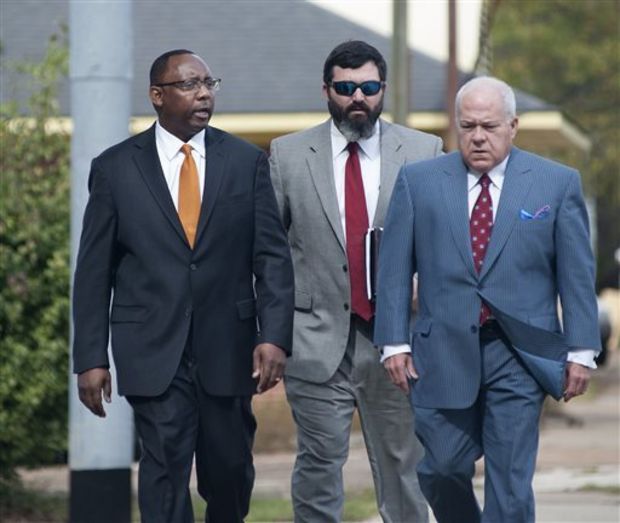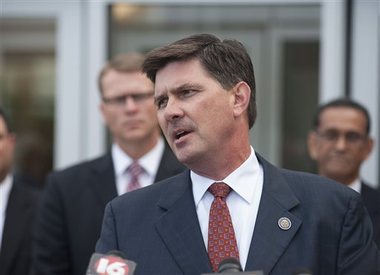

JACKSON, Mississippi (AP) — Former Corrections Commissioner Chris Epps was a success story in Mississippi government until federal officials unveiled a lengthy indictment charging him with taking about $1 million in bribes from an ex-lawmaker who did business with the prison system.
Epps worked 32 years for the state Department of Corrections and was the department’s longest serving commissioner, with a dozen years in that position. He is a double rarity — an employee who started at the lowest rung and worked his way to the top, and an agency director who was chosen by and served under three governors, one Democrat and two Republicans.

Epps, 53, resigned his $132,700-a-year job as commissioner Wednesday, and federal prosecutors the next day released the indictment charging him and former state Rep. Cecil McCrory in a bribery scheme that allegedly provided Epps with luxury vehicles, an upscale home in a gated community outside Jackson and a beachside condominium on the Mississippi Gulf Coast.
Prosecutors say that starting in 2007, Epps steered prison-services contracts toward companies with which McCrory was affiliated as owner or consultant. Epps is charged in 40 felony counts and McCrory in 15.
“This crime was made even more offensive because of the respected positions in state government that have been held by Mr. Epps for so long and the multitude of positions in state and local government that Mr. McCrory once held,” acting U.S. Attorney Harold Brittain said Thursday outside the federal courthouse in Jackson, moments after Epps and McCrory pleaded not guilty.
McCrory, 62, served in the state House from 1988 to 1994 and has been a Rankin County justice court judge. He resigned Tuesday as president of the Rankin County School Board.
During their brief court appearance, Epps and McCrory stood with their attorneys and rarely made eye contact with each other. A Jan. 5 trial date has been set. Neither Epps nor McCrory would comment as they left the courthouse.
The former commissioner’s subdued demeanor was in contrast to his usual gregarious personality.
For years, Epps has been popular among legislators with firm handshakes and sideways hugs for men and women alike. The Department of Corrections issued newsletters that typically featured a large photo of Epps on the cover and lots of grip-and-grin photos inside, showing Epps with elected officials or prison employees.
“I don’t know of any legislator who ever spoke ill about him, except for maybe one or two,” said Senate Corrections Committee Chairman Sampson Jackson, D-Preston.
Legislators in 2013 unanimously adopted a resolution commending him for becoming president of the American Correctional Association, a group of prison officials and law-enforcement officers with a Code of Ethics that specifies members “shall treat every professional situation with concern for the welfare of the individuals involved and with no intent to personal gain” and “shall refrain from using their positions to secure personal privileges or advantages.”
Epps is a native of the tiny Delta town of Tchula, and he earned his bachelor’s degree in elementary education from Mississippi Valley State University. He started working in 1982 as guard at the Mississippi State Penitentiary at Parchman. He moved up through several jobs in the Department of Corrections, including director of treatment services, chief of security, deputy commissioner of community corrections and deputy commissioner of institutions.
He was first appointed commissioner by Democratic Gov. Ronnie Musgrove in August 2002, and was kept on the job by the man who unseated Musgrove in 2003, Republican Haley Barbour. Epps served through both of Barbour’s terms, and was kept by a second Republican governor, Phil Bryant, who was elected in 2011. Senators confirmed Epps for the job three times — in April 2003 under Musgrove, in May 2004 in the early months of the Barbour administration and in May 2012 in the early months of the Bryant administration.
Mississippi’s prison system grew substantially larger and more expensive under Epps’ tenure, and it wasn’t unusual for him to tell lawmakers midway through a budget year that the agency would need millions more dollars to get through the year. He sought pay raises for some of the department’s lowest paid employees, and acknowledged publicly that it was difficult to recruit people to work as guards in high-stress jobs with starting pay of $22,000 a year.
“Most of the time, I found him to be accurate and very consistent,” said House Appropriations Committee Chairman Herb Frierson, R-Poplarville. “He presented himself well, just about any time you met with him. He was knowledgeable and easy to get along with.”
Epps served in the military and retired in 2008 as a lieutenant colonel in the Mississippi National Guard. He earned a master’s degree in guidance and counseling from Liberty University in Lynchburg, Virginia. He has also been a Church of Christ deacon.



